by Jenny Rose | Sep 11, 2022 | Choice, Power
Probably every child is told we all have to do things we don’t want to do.

Photo by Cristina Gottardi on Unsplash
Children are concrete, and I was no exception. When I heard we all have to do things we don’t want to do, I thought it meant that’s what life was supposed to be about, a kind of slavery to all those things we don’t want to do. No one talked to me about balance, or doing the things we do want to do.
It made life seem like an unhappy business, years and years of unending duty, responsibility, and doing what I didn’t want to do. No recess. Or maybe what I really wanted to do was bad and wrong? Maybe I should want to do what I didn’t want to do. I wasn’t sure. A part of me went underground. I didn’t want anyone to know how bad I was, how flawed. I worked hard at the things I didn’t want to do and hid the things I did want to do, in case they were wrong.
But I couldn’t conceal the feeling of wanting and not wanting from myself. I used to make hidey holes in whatever house we were living in at the time and go to ground with a book, but I always felt guilty. I wanted to read. Doing what I wanted to do was bad. I should have been helping my mom do all the things she didn’t want to do.
The pronouncement that we all have to do things we don’t want to do is stated as a Cosmic Truth, especially as an adult tells it to a child. It’s loaded with feelings and experience a child can’t possibly understand, but the subtext was clear to me:
Life is not much fun.
I can’t resist picking apart Cosmic Truths as an adult, and as I think about this one it occurs to me it really has to do with personal power more than wanting or not wanting. It’s not framed in terms of personal power because our emotional intelligence is so low. Making choices based on whether we want to do something or not is childish. Power resides in the act of choice, not in the wanting or not wanting.
Steering our lives solely by our desires is hedonism, a belief that satisfaction of desires is the purpose of life. Desire, though, is so shallow, so fleeting. And it’s never permanently satisfied. No matter how well and pleasurably we’ve eaten, we’ll be hungry again. Desire is a treadmill we can never get off.
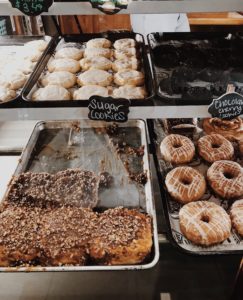
This is not to say we shouldn’t ever choose something we want or say no to something we don’t want, but our desire is easily manipulated. That’s why advertising works. If we can be easily manipulated, we’re not standing in our power. Addiction is based, at least in the beginning, on wanting and not wanting.
A more useful question than What do I want to do? is What would be the most powerful thing to do? We might want to eat a carton of ice cream, but a walk feeds our health, well-being, and thus personal power much better. After all, one carton of ice cream leads nowhere but to another. Personal power can lead us to joy and experience a carton of ice cream never dreamed of.
- If we don’t choose to do difficult, frightening, or new things, we’ll never grow.
- If we don’t choose to take care of our bodies, they won’t function well.
- If we don’t choose to be self-sufficient and resilient, we’ll be dependent.
- If we don’t choose to learn anything, we’ll remain ignorant.
- If we don’t choose to plan ahead, prepare, or manage consequences, we diminish our choices, waste resource, and weaken the contribution we’re capable of making.
- If we don’t choose the responsibility of commitment and making choices, someone else will make our choices for us.
And so on.
I’m changing the frame. I’m less interested in what I want and what I don’t want and more interested in how my choices affect my power, and the power of those around me. I’m willing to do what I don’t want to do if it’s a step on a road leading to integrity, power, healthy relationship, or anything else important to me. At the same time, I can exercise my right to say no to things that won’t take me where I want to go.
It’s about power, not desire. Any three-year-old can want and not want. It takes an adult to manage a healthy balance of personal power.
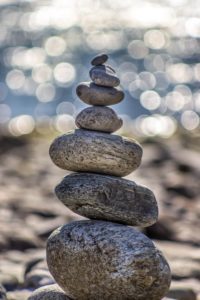
Photo by Deniz Altindas on Unsplash
by Jenny Rose | Jun 7, 2018 | Aging, Connection & Community, Emotional Intelligence
Have you ever had a dream of finding an undiscovered room in a familiar house? I have, several times. I like those dreams. A large piece of furniture moves aside, or I walk into a room I know well and find a new door in it.
Last weekend, my partner and I went to our small local theater and I saw Book Club while he went happily off to Deadpool. (Honestly, I’m so tired of comics, superheroes, space adventures, special effects and unending battles and chases. Whew. It felt good to say that.)
The movie was a relief. I didn’t have to spend most of it with my eyes shut trying to filter out the entirely overstimulating and, at the same time, boring hyperactivity, and it wasn’t excellent. It didn’t require anything from me except to sit back and relax.
No spoilers and this is not a movie review, but Jane Fonda tries way too hard. Instead of marveling at her artificial youthfulness, I felt rather sorry for her. There was also a lot of unnecessary drinking. It didn’t add anything to the story. Some of the humor was more of a wince than a chuckle, but there were some truly funny moments. The writing was a little inconsistent. It’s a movie about connection and being an aging woman.
Overall, I could relate to these four women and I found the movie oddly touching in an unexpected way. I’ve been thinking about it ever since, in fact, trying to understand why it made me feel so bittersweet.
It has to do with giving up. Well, not really. Not giving up, exactly, but settling. No, that’s not quite right, either.
It has to do with gradually forgetting to entertain possibility.
That’s better.

Photo by Joshua Rawson-Harris on Unsplash
We inhabit our lives like a house. It’s a finite space, and we’re intimately familiar with the floorplan, the closets, the windows and the doors. Our house is defined by ourselves and the way we live, and it’s also defined by the external world and people around us. Outside our house is a world where all kinds of potential physical and emotional harm crouches, waiting for us to take a risk and leave our shelter. Outside our house is a wilderness of Unknown.
When we’re young the house of our life is new and exciting. We experiment using the space in different ways. We begin to figure out what we like and don’t like, what works well in our lives and what doesn’t, who we can live with and who we can’t live with. We gradually accumulate furniture in the forms of memories, scar tissue, hand-me-downs, beliefs, and new stuff we find all by ourselves.
The years go by and we learn a lot (hopefully) about the way the world works and who we are. We notice an ever-enlarging population of people younger than we are.
Then, one day, we’re in our fifties. Then our sixties. Then our parents are old. Not older. Old. How did that happen? Then our kids are as old as we were when we had them. It’s entirely disconcerting. We begin to think of ourselves as middle-aged and secretly feel older than that a lot of the time. Then, if you’re a woman, comes menopause, which, just as the onset of menstruation changed everything in the beginning of our lives, remodels our house.
For one thing, we need to tear out the heating system and replace it with cooling and fans.

Photo by Ian Espinosa on Unsplash
By this point in my own life, I’ve made a lot of choices and taken notes on how they worked out. I’ve made decisions about what I will and won’t do, and about what I am and am not interested in. I’ve decided what dreams to discard and interests to drop, because I’m out of time, energy or both. I’ve decided I know exactly who I am, what I’m capable of and what I need and want. I have an entirely private (because it’s shameful) list of things I’ve given up on.
Book Club speaks to the ways in which we begin to limit possibility as we age. In my case, it has nothing to do with age, though. I’ve been slamming doors behind me my whole life. When I was 18, I turned my back on high school. When I was 20, I left residential college, never to return. When I was 21 and got married, I gave up on dating or looking for love. When I was 27 and had my first child, I stopped dreaming of freedom and adventure.
And so on.
Of course deciding we’re never going to do something ever again practically guarantees the Gods will throw it back to us sooner or later, giggling. Now when I hear myself say, “Never again…” I can smile.
An even darker aspect of refusing possibility has to do with the dreams and desires we’ve never fulfilled. I’ve always struggled with financial scarcity. I tell myself nearly every day I’ll never be financially successful, and it doesn’t matter, because I have a good life, I have what I need, I’d rather have my self-respect and integrity than be rich (note the belief one can’t have both), and it’s not a big deal. I say all those things to myself because I don’t see any possibility of financial security. If I haven’t found it following all the rules and working so hard, then maybe I don’t deserve it, or it’s just not something I can earn or have. I don’t want to live the rest of my life hoping for something that never happens.
The story I tell myself is I’d love to find a great job where I could contribute my talents, do meaningful work, be part of a team and get adequately paid. I’m always watching and listening for that job. But I know I’m too old, the things I love to do will never pay well, the kind of thing I’m looking for wouldn’t be here in rural Maine, and I’ll struggle to maintain adequate housing and feed myself forever.
If there’s no possibility, I can work on accepting what is and try to be peaceful.

Photo by Nathan Dumlao on Unsplash
Book Club was redemptive. It reminded me possibility still exists for me. I’ve done things in the last five years I never imagined doing in my wildest dreams. Why do I think it’s all over now? Why do I make so many iron-clad assumptions about the size and shape of my house? Why am I deliberately trying to ditch my dreams? Why do I think of myself as a food item on the pantry shelf with an expired sell-by date?
Am I too old and jaded to invite miracles? Am I too worn out to move a piece of furniture (a bookcase, what else?) and discover a door behind it I never saw before? I know I’ve yet to discover my highest potential.
Maybe I’m just not very brave. I don’t want to fail anymore. I don’t want to be disappointed or feel I’m a disappointment, ever again. I don’t want to be let down, or hurt, or stood up or rejected. I don’t want to look like a fool. (I don’t mind being a fool, but I don’t want to look like one.) I don’t want to be scared.
I don’t want to play power games with people.
Perhaps this is the crust of old age, this gradual accumulation of weariness, scar tissue, limiting beliefs, and physical changes that keeps us sitting in our familiar, safe house, where the edges and boundaries are well-defined and unchanging and we control the dangers of possibility.
Some people successfully shut out life, or shut themselves away from it. I’m never (there I go again) going to be able to pull that off, though. I’m too curious and too interested. An overheard remark, a movie, a conversation, a book or even a song lyric invariably comes along and kicks me back into motion when I’m threatening to lock myself permanently in the predictability and safety of my house. Then I begin to write, and the walls waver and shimmer, new doors and windows appear, a corner of the roof peels away to show me the sky, and I remember I’m still alive, still kicking, still wanting and needing and still, in spite of my best efforts, dreaming of possibilities.
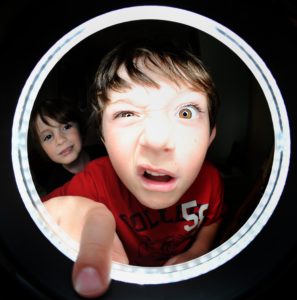
Photo by frank mckenna on Unsplash
All content on this site ©2018
Jennifer Rose
except where otherwise noted
by Jenny Rose | Oct 5, 2017 | Emotional Intelligence, Feelings, Love
A few weeks ago I wrote about romance and in that post I confessed that at this point in my life I’m not sure what love actually is. A strange admission from a reasonably intelligent, well-educated, middle-aged broad with two marriages and two children in her history.
Writing that post enabled me to clearly separate romance from love; though I suppose love might include a little romance from time to time. I’m convinced romance is not synonymous with love, however. I began to make a mental list of what love is not, as I often approach things from the back door first. Love is not a synonym for:
- Romance
- Sex
- Slavery
- Control
- Possession
- Obsession
- A suicide pact
- Abuse
- Fear
- Duty
- Obligation
- Enabling
- Obedience
All right. So what is love? My Randall House Collegiate Dictionary says it’s “a profoundly tender, passionate affection for a person” or “a feeling of warm personal attachment or deep affection.” This definition doesn’t satisfy me at all. My rewrite is that love is a feeling of warm, tender connection and deep affection. I don’t think love is always passionate and I don’t like the word attachment. If anything, love implies to me an attitude of nonattachment.
But what about unrequited love? What about failed love or withdrawn love or love as a weapon or a tool? What about the inability to accept love, or feeling unloved though being told we are? What about those who make us feel our love is ugly, twisted, shameful or inadequate?
I’m always playing with words in my head. This week it’s “What is love?” and “What is a crone? and “What are the differences between compassion, empathy and sympathy?” I lie down with those inquiries and wake up with them. I turn them over while I shower, cook bacon, wash dishes, take my morning walk, practice Tai Chi and drive to town. I’m constantly scribbling notes.
I gave a neighbor a lift this morning and asked him to talk to me about compassion, sympathy and empathy. Poor man. He didn’t know what to make of me.
Yesterday, during my frosty morning walk, I dove into a stand of staghorn sumac below the barn and went to visit the spring. This is a daylight spring seeping out of the hill on which the barn and house stand. A long time ago, someone dug a well there, and at one time a pump and tank were installed, along with a system of black plastic outdoor lines to carry water to and from the barn, the garden, and down through the woods to, presumably, crops in the fields below. All the equipment is many decades old now, fallen over and covered with leaves and moss. The well is protected by a round cement cap, much too heavy for me to lift alone (drat!).
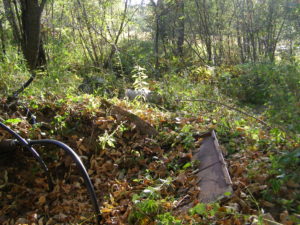
Spring
This spot is hidden in a thick tangle of vine, briar and trees. We rarely go in there, though it’s in close proximity to the barn.
It’s fall and it’s been dry, but the drainage where the spring emerges is clearly marked by rocks and moss. The ground underfoot felt soft, and when I brushed away the leaves I found moist earth. A yard or two below that is mud, and then a trickle of water and then, at the bottom of the hill, a quiet film of water, barely moving, reflecting the tree-laced sky. Right now It’s full of apples dropped from an apple tree that grows alongside it.
As I slipped and slid, tripping over vines and getting scratched by hawthorn and raspberry bushes, feeling the velvety moss coating the rocks and stepping cautiously on rotting wood, it occurred to me that love is like this spring.
I’ve always thought of love as an action verb, something I do to another in exchange for receiving the same. I thought I knew what I meant when I used the word, though I was never challenged to define it exactly. For me it’s been a catch-all term, synonymous with dozens of other, more specific actions: Want, need, desire, honor, trust, respect, care about, listen to, defend, make excuses for, enable, protect, support, believe in, etc., etc.
But what if love is just being? What if it has no object, but just is?
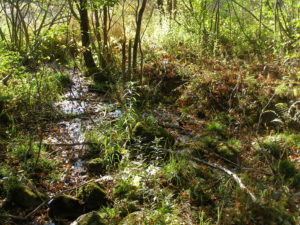
Spring
This little spring is absolutely true to itself. Water drains off the hillside above us and carves a path through the earth and rock until it emerges and runs down the surface at the foot of the hill. We pay no attention to it whatsoever. It’s reliable, predictable and faithful, but not because anyone is looking. Its unobtrusive, quiet presence has created a lush pocket of life, a complex system of plants, fungi, animals and insects, but ten yards away on the open hillside it’s invisible.
What if I make a choice to allow my feeling of love to run through my life in the same way the spring runs through and over the ground? What if I carry within me a wellspring, a hidden cleft, moist, fertile, filled with life, rich in sensuality, simply because it’s an expression of self? If others find their way to it, sit a while, bathe, drink, and allow it to nourish and refresh them, they’re welcome. If others can’t see it, or don’t value it, or dislike the perfume of rotting wood and leaves or the feel of plush moss under their bare foot, it’s nothing to do with me. Not everyone chooses to make their way through raspberry and hawthorn bushes, after all.
What if I don’t need anything in return because I’m giving nothing away? Perhaps the act of love can be a simple state of being, not a totality, not a hurricane of passion and lust, not a romantic fairytale, not a prison and torture chamber, but a spring, a waterway, a shining thread I can share without depletion. Can I allow it to seep quietly up through the roots of my experience, even if no one else ever finds it, wants it, returns it or deems it acceptable?
Our spring is part of a landscape of field and forest, river, pond and stream, rocky hillside and bog. The landscape contains many forms and embraces many systems of life. Birth and death happen on this land. Disease, erosion and flood happen on this land. Prey and predators carry out their sacred dance of balance here. Blood, bone, fur, feather, antler, musk, urine and feces are all here.
I, too, am a complex system of history, memory, belief, thought and feeling. I do not feel love for everyone and everything. My experience of love is that it’s a wild thing; it seeps up where it will and trickles away without warning, taking no account of rules and expectations. I can’t command it and I don’t choose to hold it back. My love doesn’t need anyone’s reception, appreciation, validation or praise.
Love is. I reserve the right to love as I will. I am the keeper of my own wellspring.
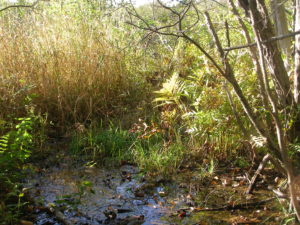
Spring 10/2017
All content on this site ©2017
Jennifer Rose
except where otherwise noted
by Jenny Rose | May 11, 2017 | Emotional Intelligence, Feelings, Happiness
For many years, I’ve been a story teller. I’ve told stories in nursing homes, schools, at seasonal events and in women’s circles. I think of stories as medicine, as guidance, as blueprints for living. Old stories from cultures around the world contain information we’ve forgotten or lost about how to live well.

Photo by Syd Wachs on Unsplash
It’s striking how often I share a familiar and oft-told story with an audience that suddenly turns out to be what I most need. Oral stories, if written on a page, look static and lifeless. They’re not. An oral story lives. It twists and turns and wriggles unexpectedly in the mouth. Every time I tell a story it’s a different telling than I’ve ever done before. Every time I tell a story I’m different than I was the last time I told it. Every audience is different.
I’ve discovered blogging is like that. As I blog, I think of the reader. I blog to make an external connection. As I create posts, though, I also discover deepened connection with myself. My writing reveals my truth to me, and shines a light on the places where I’m not living what I know is my truth.
Last week I posted about quitting. In essence, I gave permission to all of us to change, to grow, to seek happiness in our work and in our lives. Ever since I resigned from my job (last day will be Saturday) and wrote that post, I’ve noticed an internal feeling of rediscovery, freedom and fizzing joy.
I only worked 20 hours a week at that job, but the choice to force myself to do it, even though it didn’t make me happy or meet my needs, cast a shadow of apathy over the rest of my life. It dulled my response to my own distress. It fed all those powerful voices that tell us there’s no help for it. We have bills to pay. We have responsibilities, duties and obligations. The most sinister voice of all says this is the best we can hope for or deserve.
I was empowering fear, not love.
All of a sudden, I’m operating with new clarity, the kind of clarity that the right story at the right time brings. This week I’m acutely aware of what’s working well for me and what’s not. I feel my power to choose afresh. I’m not motivating out of fear. Somehow, fear is taking a vacation. I’m motivating out of curiosity, pleasure and the desire to actually be happy.
For me, this is a crime of immense proportions.
I want to be happy. It occurs to me this isn’t a childish pursuit. It’s the pursuit of real personal power.
I follow a blog by Dr. Sharon Blackie, who is a writer, psychologist and mythologist. I’m reading one of her books, The Long Delirious Burning Blue, which has a passionate delicacy I haven’t experienced in a new read for a long time.
Dr. Blackie recently returned to the place she calls home in Connemara, Ireland, and her last couple of blog posts are about taking a walk with her dogs on the land that she loves.
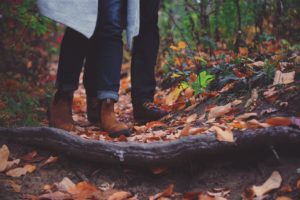
Photo by Takahiro Sakamoto on Unsplash
That’s all. Taking walks. She posts pictures of the lochs, a stream, the bog and the mountain. There are pictures of her dogs, and I imagined wet, muddy paws and soft black and white coats tangled with leaves and stems. I think these posts are among the most joyful and powerful things I’ve ever read, not because Dr. Blackie is an extraordinary scholar and writer, which she is, but because she writes as a woman who’s come home to the place she belongs after a long time away. Her delight and reverence for the land and the life it supports radiate from every word and picture.
That’s how I feel this week, but my homecoming is internal rather than external.
I’m familiar with some of my terrain. Over the years, I’ve learned some of what I am. Always, though, there have been caverns, edges and deep forest I haven’t explored. Perhaps I knew all of myself before my memory in this lifetime begins, but if so, I’ve forgotten.
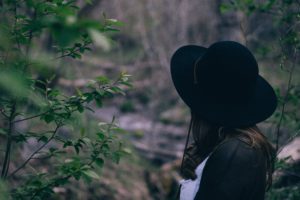
Photo by Cameron Kirby on Unsplash
This week I’m a wanderer, an explorer, a solitary traveler in my own psyche. I leave my well-worn internal paths to roam under trees. I follow the sound of water. I read my own spoor and run my hands over moss-covered rocks. I hunt in vernal pools for singing frogs the size of my toes. I wade through bogs of memory, getting my feet muddy and losing my shoes.
I’ve found old, abandoned structures smelling of rot and damp where birds nest and bats cluster. I’ve stumbled upon shallow graves where, once upon a time, I discarded and abandoned parts of myself. I’ve tripped over fallen idols, are now covered in a lacy blanket of ferns, found forgotten altars and pulled mats of dead leaves out of fountains I haven’t seen in years so clear water can flow again.
I’ve found shed skins whispering and rustling with memory, nearly invisible overgrown paths, and ruts and scars from old burns, floods and landslides.
I suddenly remember the happy feeling of waking early in the morning and going straight outside. I release myself from the expectation that I’ll work well in the last third of the day, a thing I’ve never in my life been able to pull off. I listen to music I love. I read what interests and moves me. I write lists and journal entries, blog posts and edits for my book.
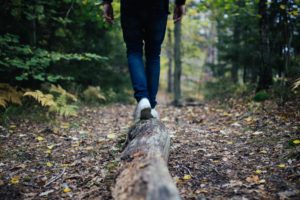
Photo by Jon Flobrant on Unsplash
Like Dr. Blackie’s dogs, I follow what catches my attention. I move along scent trails, noting the passage of all my selves, spiraling from what I’ve been to what I’ll become and back again. I dance from thought to thought, from word to word, from dream to dream. I cast myself into a wider pattern of life.
It’s not that I don’t want to do anything. On the contrary, I want to do a hundred things. I want to do much more than I did when I was structuring my time and energy around my job. I can hardly wait to get out of bed and see what the day brings. I want to play outside, take care of tasks inside, read, write, watch the birds at the feeders, stretch, dance, swim, listen to music, make a list and check things off, be present in my relationships, make new friends, pursue intriguing new connections, earn money joyfully, and see how much I can want and how gloriously I can dream.
I’ve written about leaving home before, and in that post I wrote that in some counterintuitive way leaving my old external home in Colorado allowed me to begin to finally come home to myself internally and reclaim my power. I’ll never think of home solely as a one-dimensional place in the world again. Home is not just a house, not just a beloved landscape, but the place where my dearest friend, my most passionate lover and my most loyal companion reside, along with my deepest power. Home is my own wide-flung arms, my own pulse and breath, my own joy. Home is me, myself.
Somewhere along the way, we forgot that the most important things are also the simplest. There’s great power in being happy. If happy is missing, life is muted and apathetic at best. This is when the power of boredom and the power to quit come to our aid. This is when choice becomes something we must fight to reclaim as if our lives depend on it … because they do.
Claiming the power of happy. My daily crime.

Photo by Senjuti Kundu on Unsplash
All content on this site ©2017
Jennifer Rose
except where otherwise noted














